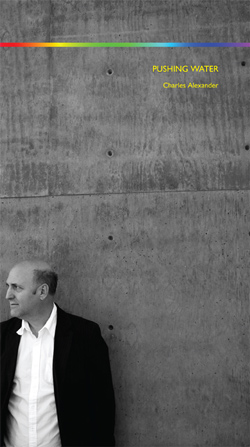
Reviewed November 2, 2012 by Patrick James Dunagan.
“cover my face with words”: Charles Alexander’s poem of life
Getting through day to day living, fulfilling the responsibilities of family and occupation, is demanding enough; yet in the face of meeting such necessities Charles Alexander chooses poetry.
At over two hundred pages, Pushing Water, with its fifty-two numbered sections of varying length, is the result of years of writing. Alexander utilizes an array of loose formal constraints with consistent, playful skill. This book-length poem joins the likes of Louis Zukofksy’s A or Bernadette Mayer’s Midwinter Day as a practiced endeavor towards meeting the daily business of living with writing: a testament to the abiding determination to have the daily practice of writing and reading serve as a guiding force through life. The Poem as source and sustenance, it’s nothing less than an all in commitment.
pushing water air and
light pushing water
walk and release
the pins fall in small
explosions, corridors
of wanted
correspondence
the body tense moving
releases in smooth anguish
overlooked on Sunday
morning pushing water
body mixes body and
falls air pushing water
Alexander’s poem reflects how repetitive and seemingly unending the mundane aspects of life often appear. Yet under the guidance of his balanced hand, this monotony is transformed, filtered through the poem, which arises from and erases the bordering lines between our writing/reading lives and the rest of the hours we spend living. This is the poem’s action, its excitement. As Alexander moves the writing from one setting into the next, each spins out, and off, into another (the next line, book, event, image, etc.). As day by day, page by page, from room to room the poet’s eye passes among things, roving about and taking everything in.
and nothing saves anything in the blue
canoe or the white haze as we
spin off the road into another
turn of fate turn of face turn turn
and how it moves may be the
focus not what it says or who
it’s for but how it sways from one
line or syllable to the next bleary
intention how it stands up to be
noticed and simply continues
are you listening are you reading
These lines are from section 37, which carries the dedication “for Robert Creeley & Rae Armantrout.” The dedicatees are two more poets among the many (such as the already-mentioned Mayer and Zukofsky) in whose work Alexander is indebted. Likewise, clearly referenced throughout the poem are preoccupations found commonly in the work of Charles Olson and Robert Duncan, Alice Notley’s book-length poem-series—one of which, Reason & Other Women, Alexander’s own Chax press published— also have no doubt spurred Alexander’s writing onward through the years.
Pushing Water follows Allen Ginsberg’s mantra printed on numerous Naropa MFA program brochures over the years: “Mind is Shapely, Art is Shapely.” In “Notes Written on Finally Recording Howl,” Ginsberg explains this slogan as “[m]eaning Mind practiced in spontaneity invents forms in its own image.” Alexander’s poem in effect discovers itself as it goes. Different sections of the poem either take form according to varying procedural constructs or else follow Alexander’s impulses at the time of writing. During these more improvisatory sections, with their clearly organic practice of prosody, again and again Alexander echoes the lineage of poets best represented as descendant from Donald Allen’s now more-than-infamous anthology New American Poetry 1945-1960.
Although he does display the entrapments of a too-absorbent cocoon of inescapable indebtedness to precursors, Alexander nevertheless demonstrates an engaging mastery of perceptively detailed writing with exacting care. He gets down experience as it arrives despite the hazardous jolts of at times shifting perspectives. And as a reader I trust Alexander’s precision. He is always keeping up the poem in the midst of whatever’s happening.
the lens distorts as soon as
I sees, against its will
it retreats to a seat by
the mirror, where only
what precedes us in the
room comes into view
deep room with narrowing
walls that are white and do
not contain any cracks, stainless
steel chairs hold bodies in trust
to sleep, perchance to wake
nothing wants to move
we could call that inertia
but it would not stir the heat
pretend the ice moves slowly
down the back up
the other side between
the breasts there is nothing
sexual save the fact
that everything runs there
but here it’s just a method
pushing away heat
When I first saw Pushing Water I thought how strange a title it seemed. When recently describing the book to my sister I had an out-loud, ad lib brainstorm about how maybe, just maybe, it is meant as a reference to how the human body is some 90+% nothing but water. That perhaps Alexander intends his poem to be a reflection of how, quite literally, as we go about our business, walking about the world from here to there, doing this or that, we are all the time transporting within us all this water. We lug our bodies about. In effect: pushing water throughout our days.
I don’t know if this is in fact what Alexander has in mind and I doubt I’ve fully done justice to articulating it here, yet reading through his book I’ve been unable to locate any other explanation. I find it to be an awkward image at first, which becomes somehow lucidly balanced with time, much like the experience of getting your sea legs. The longer I reflect on it and the deeper it sinks in, the better able I am to begin to feel myself finally getting with it. At any rate, one definite thing to be said about Pushing Water is how visceral a reading experience it offers; Alexander situates the poem so the reader feels at times as if tugged and spun about. It may be disorienting, but it’s also a solid accomplishment.